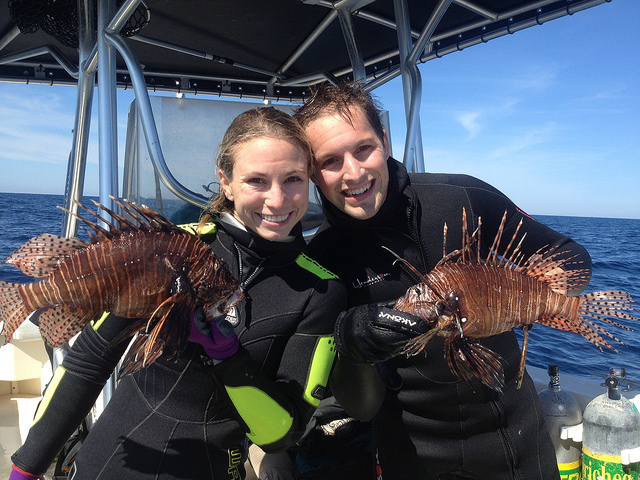The Lionfish: A Crazy-Looking Saltwater Fish
By Debbie Hanson
Aug 16, 2015
If you happen to come across a crazy-looking red or brown striped saltwater fish that has 18 venomous spines and appears to have swam straight out of a National Geographic documentary, your first instinct is probably going to be to swim in the opposite direction…
If you happen to come across a crazy-looking red or brown striped saltwater fish that has 18 venomous spines and appears to have swam straight out of a National Geographic documentary, your first instinct is probably going to be to swim in the opposite direction… until you learn more about this saltwater fish species and how you can help wildlife officials keep its population numbers in check.
Lionfish Invasion
Native to the reefs and rocky crevices of the Indo-Pacific, the lionfish (sometimes referred to as turkey fish, dragon fish or scorpion fish) has made its way into the warm waters off of the Atlantic Coast of the United States. Since the lionfish is not native to U.S. waters and has no known natural predators, angler efforts to catch and remove lionfish are highly encouraged.
The Lionfish Sting is No Joke
Catching and removing lionfish will help preserve our native marine species and habitats. Although, anglers need to be aware that the handling of these peculiar saltwater fish should be done with a great deal of care due to the venomous spines that are located along the front of the dorsal fin and on the pelvic fins. Additional venomous spines are located along the front edge of the anal fin, which is located on the bottom of the fish near the tail.
Best Saltwater Fishing Gear for Catching This Beast
This species is most successfully taken while spearfishing, but can occasionally be caught on hook and line. On hook and line, try using a two-hook bottom fishing rig with live shrimp on a 20-pound conventional rod. Once caught, it's best to use shears to cut off the spines while the spear or hook is still in the fish.

How to Report a Sighting
If an angler isn't comfortable with removing a lionfish from the water, sightings should still be reported and are helpful to researchers who are collecting data on this saltwater fish species. The USGS and REEF have maintained two of the largest and most detailed sighting databases. FWC also offers a Reef Rangers program, which was initiated to help clean lionfish off of selected Florida reef sites as a team or individual.

The Lionfish is Still Good Eatin’
What many people don't know is that it is legal to eat this saltwater fish. The flesh of the lionfish is not poisonous or venomous (just the spines), and is considered to be of excellent food quality by most people who taste it. Lionfish can be substituted in recipes for other non-oily fish and can be fried, broiled, baked, steamed, poached or even served as sushi.
Most lionfish are taken by spearfishing, but they can occasionally be caught on hook and line. If you want to try your luck at catching a crazy-looking lionfish by hook and line, make sure you buy a recreational fishing license online beforehand.
Photo credits: Florida Fish and Wildlife Conservation Commission









